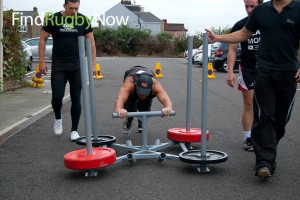 This past weekend the FRN 7s Rugby Team was taken through their paces by the professional trainers at Foundry:east, a new gym in East London where you can train like a professional for a fraction of the price.
This past weekend the FRN 7s Rugby Team was taken through their paces by the professional trainers at Foundry:east, a new gym in East London where you can train like a professional for a fraction of the price.
The session was broken up into two sections: (1) an explanatory/in the classroom, which was taught by Graeme Marsh (Foundry Director) and (2) a sprint and strongman session, which was taught by Dave Thomas (Foundry Director) and Fee Pocock (FRN blogger and England International). The sessions focussed on how rugby players should train during the season.
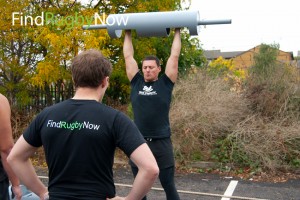 We wanted all of our readers to benefit from the Foundry team’s knowledge and training, and they have kindly agreed to provide us with a two-part blog series which covers the explanatory and practical sessions they did for us. Graeme kicks of with the first of these blogs below.
We wanted all of our readers to benefit from the Foundry team’s knowledge and training, and they have kindly agreed to provide us with a two-part blog series which covers the explanatory and practical sessions they did for us. Graeme kicks of with the first of these blogs below.
To check out more photos from the FRN 7s training session with Foundry:east click here.
Top Tips for Training In-Season
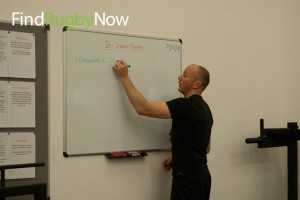
Graeme Marsh presents his top tips for in-season training
It didn’t make for good reading, but ever the diplomat I asked “how are you getting on with this?”.
His reply was “Man, it is wiping me out. I can’t do anything after it and I’m knackered before the game even starts”.
It wasn’t that it was necessarily a bad training programme, in fact if he had been a 22-year-old bodybuilder on anabolic steroids then he probably would have seen some progress.
What it did though was illustrate perfectly how you need to adjust training programmes during the season to reflect the demands that field training, games, and life in general can have on the body.
Too many players try to sustain a regime that would be draining in the off-season, let alone during it. So, with that in mind here are a few tips for anyone looking to develop their strength and power during the season and how to avoid making some of the most common mistakes.
1. Gym training volume must decrease during the season. It is unrealistic to expect to be able to sustain a high-volume programme during the competitive season. Game and practice time will make recovery from long, high volume training sessions near on impossible for all but the most hormonally blessed players. The actual amount of work needed to develop strength and power is lower than many think, but the intensity of effort is key.
2. Focus on intensity in your sessions. To develop or maintain strength concentrate on the intensity rather than the quantity, forget about doing 25-30 sets per workout, 12-15 is more realistic. The bulk of your time should be spent on movements that target the high-threshold motor units and recruit the most muscle. To do this incorporate a mixture of plyometric movements (jumps, bounds etc), olympic style movements (clean pulls, Snatch pulls etc) with high-intensity loads in the big lifts (below 6 reps per set) as the mainstay of your training.
3. Let your recovery dictate your training. If you had a hard game, took a lot of hits and played a full 80 minutes then you may need longer recovery before hitting the weights. Similarly if you only had a run out for the last 15 minutes then you may be able to hit the gym monday morning feeling fresh. Be flexible in your week to week planning and adjust what you do to match your ability from week to week. If you feel tired and beat up, take a sauna and then stretch, you’ll feel the benefit and come back fitter and stronger.
4. Listen to your body and watch for signs of overtraining. Too much work with inadequate recovery will eventually lead to overtraining, which can take a long time to fully recover from. If you start to see weights going down from week to week, every weight (even the empty bar) starts to feel heavy, if sleep is poor or you wake up feeling heavy and tired after a full 8 hours, or you feel performance during the games suffering then you need to check that your training isn’t contributing to this. Don’t be afraid to build recovery weeks in to your training, so few people actually do this for fear of suddenly getting weaker or smaller, where the opposite is more likely to happen as the body gets time to rest and adapt.
5. Keep things simple. The aim of your gym session is not to try and spend a load of time and effort on pointless ‘sport-specific’ exercises that are currently popular in the fitness media. Wobbling about on Bosu balls or doing the latest ‘functional’ craze is merely a waste of time that could be spent actually getting stronger or stretching and recovering from the weekend’s game. Stick to the fundamental movements of deadlifting, squats, presses, pulls, and rows and you won’t go far wrong.
6. Put recovery methods first in your training. Stretching is practically impossible to do too much of, but it is the most neglected aspect of most people’s training. A lack of adequate flexibility will lead to increased risk of injury, muscle imbalances, and a lack of any real progress in training. Being big and strong is pointless if your hips are so tight that your speed is impacted negatively and your lower back exposed to increased injury risk. The common ‘wisdom’ is to only stretch after having done the rest of your training, but this means that stretching is generally done poorly, with minimal focus and therefore negligible results. Ideally dedicate separate time to stretching work as it can be done anywhere, but if time is an issue (which for most it is) we tend to do it first. Contrary to what many internet experts advise I’ve never seen detrimental results from this.
7. Work with a trainer who knows their stuff.If you can then invest in some time with a professional coach who understands how to design training programmes for you that will address the above points. It isn’t rocket science, in fact it is largely common sense. Having a good coach will give you accountability, external feedback, guidance on correct technique, and someone who can monitor your training performance allowing you to concentrate on simply training hard and recovering effectively. Our team at Foundry:east specialise in working with active busy professionals on this, you can find out more at www.foundryfit.co.uk.
By: Graeme Marsh MSc: Director, The Foundry








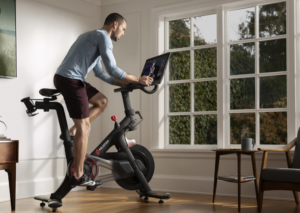 When most people hear the word “Peloton” they think of an expensive black bike with shiny red buttons and that controversial commercial where the husband gifted his wife a Peloton for Christmas.
When most people hear the word “Peloton” they think of an expensive black bike with shiny red buttons and that controversial commercial where the husband gifted his wife a Peloton for Christmas.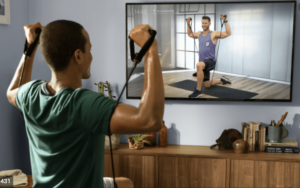 If the app interests you, Peloton is currently offering a 30 day FREE TRIAL, so why not give it a try? Check it out
If the app interests you, Peloton is currently offering a 30 day FREE TRIAL, so why not give it a try? Check it out 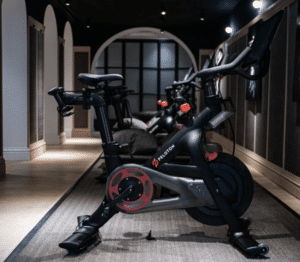
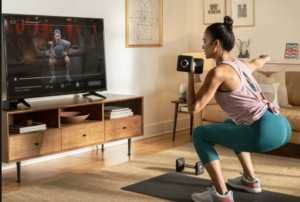
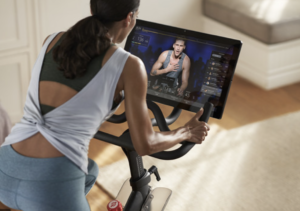 This article would not be complete, however, if we did not acknowledge some of the delivery issues that have been plaguing Peloton over the last year. Most of the delivery issues seem to affect U.S. deliveries, however, the UK deliveries have been affected as well.
This article would not be complete, however, if we did not acknowledge some of the delivery issues that have been plaguing Peloton over the last year. Most of the delivery issues seem to affect U.S. deliveries, however, the UK deliveries have been affected as well.







